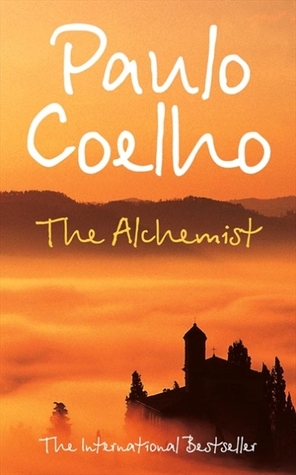The Alchemist, by Paulo Coelho, is billed as a modern classic, yet I find it difficult to discern why. It has the feel of a fable; from a time as hazy as the desert in which it is set, and carries the lessons on life one would expect from such a parable. The feelings of distant memory that it creates, however, fashion a gap between the book and the reader.
It begins with Santiago, a shepherd boy, who gives up his customs to follow a dream he has, a vision of treasure found at the Egyptian pyramids. Along the way he meets a king, a crystal merchant, an Englishman, and an alchemist; all of whom, with their passing involvement, provide him with a piece of the spiritual jigsaw that is his life. Finally, when he arrives at the Egyptian pyramids, he learns a lesson in life that brings him happiness.
The novel is short, and, while it gets its message across, a number of other things suffer. The characterisation is lean; everyone is faceless, ageless, and speaks with the same voice, a voice of implied wisdom. Most characters are also nameless; even Santiago, the protagonist, is simply referred to as ‘the boy’ throughout. Setting, also, is a casualty of the book; while we follow Santiago through the desert, we never truly get the feeling of being there. We don’t feel the heat, thirst for water, or shiver when night falls.
The prose in the book is extremely simple, giving The Alchemist the feel of a children’s book. Adjectives, especially when necessary, are rare, so that most things are described as ‘the desert’, ‘a horse’, or ‘some wine’. The desert has no texture, the horse no character, and the wine no flavour. Repetition, also, lengthens the book so that, once wisdom has been spoken, it echoes through the narrative so that each action can be credited.
The Alchemist is a quick read, but it’s not a good read. It has the feeling of a bonding session in the workplace where you discuss the implications of pseudo-situations, only moved from the office to the desert. It’s a self-help book disguised as a novel, the “secrets” of life, though hardly life-changing, are listed as stages in one boy’s discovery. And if any discoveries are necessary, it’s that you don’t need this novel.

I found the CD version (Jeremy Irons as narrator) of this sophomoric ‘classic’ on the sale shelf of my bookstore recently. The only reason I haven’t donated it unfinished to my local library is because I’m in love with Jeremy Irons’s voice and would pay serious money to listen to him read a phone book.
At least if he brings out a reading of the phone book, StilILearn, you’ll be free of this tripe.
Hallelujah! I’m not the only one who thinks that Coelho is a big IMPOSTOR. Thanks! This is the beginning of a beautiful collaboration.